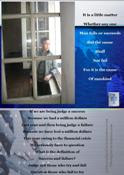



Many people believe love is a sensation that magically generates when Mr. or Ms. Right appears. No wonder so many people are single. An excerpt from "Head to Heart." And just as easily, it can spontaneously degenerate when the magic "just isn't there" anymore. You fall in love, and you can fall out of it. The key word is passivity. I think Love is the attachment that results from deeply appreciating another's goodness. The word "goodness" may surprise you. After all, most love stories don't feature a couple enraptured with each other's ethics. ("I'm captivated by your values!" he told her passionately. "And I've never met a man with such morals!" she cooed.) But in her study of real-life successful marriages ("The Good Marriage: How and Why Love Lasts"), "the value these couples placed on the partner's moral qualities was an unexpected finding."
If love comes from appreciating goodness, it needn't just happen you can make it happen. Love is active. You can create it. Just focus on the good in another person (and everyone has some). If you can do this easily, you'll love easily. I was once at an intimate concert in which the performer, a deeply spiritual person, gazed warmly at his audience and said, "I want you to know, I love you all." I smiled tolerantly and thought, "Sure." Looking back, though, I realize my cynicism was misplaced. This man naturally saw the good in others, and our being there said enough about us that he could love us. Judaism actually idealizes this universal, unconditional love. Obviously, there's a huge distance from here to the far more profound, personal love developed over the years, especially in marriage. But seeing goodness is the beginning
Now that you're feeling so warmly toward the entire human race, how can you deepen your love for someone? The way God created us, actions affect our feelings most. For example, if you want to become more compassionate, thinking compassionate thoughts may be a start, but giving charity will get you there. Likewise, the best way to feel loving is to be loving and that means giving. While most people believe love leads to giving, the truth is exactly the opposite: Giving leads to love. True giving, as Erich Fromm points out, is other-oriented, and requires four elements. The first is care, demonstrating active concern for the recipient's life and growth. The second is responsibility, responding to his or her expressed and unexpressed needs (particularly, in an adult relationship, emotional needs). The third is respect, "the ability to see a person as he (or she] is, to be aware of his (or her) unique individuality," and, consequently, wanting that person to "grow and unfold as he (or she) is." These three components all depend upon the fourth, knowledge. You can care for, respond to, and respect another only as deeply as you know him or her.
When I love someone, I might love her for just one reason or I might love her for a hundred and fifty reason. But those reasons I might always discover more circumscribe your place in the love world. The person I lve is consequently, not simply you, the whole person, but rather you circumscribe by that set of reasons. I think the object of love is the story of two improbable lovers with an unthinkable future together. Love is about the poles of the loveworld and the goal of its development, and its a creation of self. For the self that is created throught love is a shared self, a self that is conceived and developed together. And I think "Love is like a violin, the music may stop now and then, but the strings remain forever."


Tidak ada komentar:
Posting Komentar